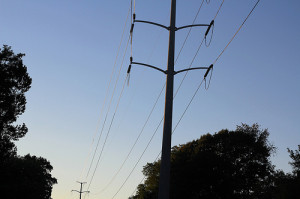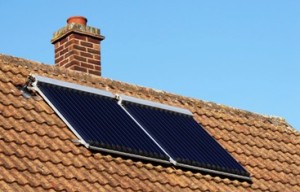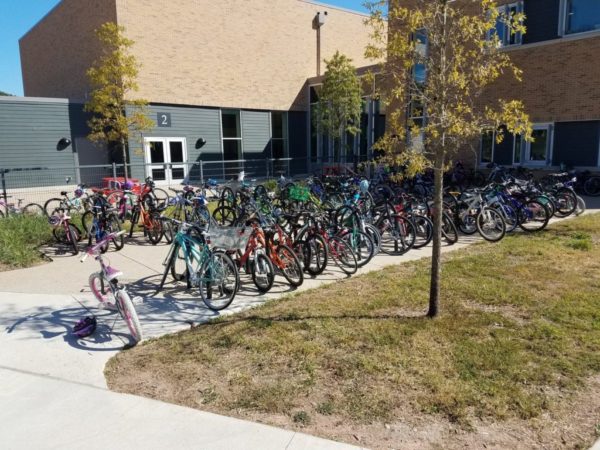Crystal City commuters were greeted by a bit of an unusual sight this morning at the neighborhood’s Metro station: a human-sized Amazon Echo.
Environmental activists with the group Greenpeace USA invited people at the station to ask questions to their very own “Alexa” Thursday, and posted a variety of signs around the area proclaiming it as “National Landing,” the name chosen by local officials pitching the trifecta of Crystal City, Pentagon City and Potomac Yard for the tech giant’s new headquarters.
It was all part of a demonstration designed to draw attention to Amazon’s practices for powering its data centers scattered across the Northern Virginia area.
Though much of the opposition to the company’s move to Arlington has centered on its labor standards or the incentive money flowing to the massive firm, this morning’s demonstration accused Amazon of falling short of its commitments to use renewable energy to fuel its 55 data centers scattered across the region.
“We asked Alexa if she thought Amazon would be a good neighbor to Virginians and she replied, ‘that depends how much you like breathing clean air,'” Elizabeth Jardim, a Greenpeace USA senior corporate campaigner, wrote in a statement. “Amazon’s cloud including Alexa is powered largely from Northern Virginia, where it uses 88 percent dirty energy — meaning every question to Alexa is driving carbon emissions.”
Activists invited commuters to ask questions of “Alexa” about Amazon’s energy practices, and the life-sized Echo (voiced by local improv instructor Donna Steele) was ready with plenty of snarky replies.
NOW: We’re in front of the Amazon’s new HQ2 in Virginia with Alexa to tell Amazon: it’s time to clean your cloud! RT if you think Amazon should stick to its promise to power is cloud with 100% #renewableenergy! #AskAlexa #ClickClean pic.twitter.com/ndHezOPOqT
— Greenpeace USA (@greenpeaceusa) February 14, 2019
"How does Amazon power its cloud?". Alexa's answer: Amazon powers its cloud with fossil fuels. "We have ten years, people!!!" Send us your question and we'll #AskAlexa!#ClimateChange #ClickClean pic.twitter.com/dtPphy32E4
— Greenpeace USA (@greenpeaceusa) February 14, 2019
Amazon committed years ago to someday using 100 percent renewable energy at its data centers, run as part of its lucrative Amazon Web Services cloud computing division.
But Greenpeace is accusing the company of abandoning that effort, even as other tech companies in Virginia like Google and Microsoft make progress.
The tech giant responded to the report by saying it’s “firmly committed” to that goal, and claimed that Greenpeace is using “inaccurate data” that “overstate both AWS’s current and projected energy usage.”
The activists stand by their numbers, however, insisting that the company address the issue if it’s to be a good neighbor in Arlington.
“Before Amazon breaks ground on its HQ2 in Virginia, Jeff Bezos needs to take responsibility for Amazon’s already massive energy demand in the state and follow through on its commitment to use 100 percent renewable energy,” Jardim said.
Arlington officials have said in the past they’ve had their own conversations with Amazon executives about the best ways to ensure that the company’s new office buildings across “National Landing” are energy efficient, but those discussions won’t proceed in earnest until the county formally signs off on the incentive package designed to bring the company to Arlington.
An Arlington elementary school is earning some kudos for its energy efficiency, after it generated more energy than it used last year.
The nonprofit International Living Future Institute awarded Discovery Elementary School with its “zero energy” certification on May 2, meaning that the school was powered completely by on-site renewable energy sources over the course of a whole year.
Discovery, which opened in September 2015, is just the fourth school across the country to earn this certification, and the largest building of any type with such a distinction, according to a press release.
The building’s designer, Charlottesville-based VMDO Architects, says Discovery’s energy systems saved Arlington Public Schools roughly $117,000 in annual utility costs. The firm also estimates that the building sent roughly 100,000 kilowatt hours of excess energy back to the electrical grid, enough to meet the average power needs of 7.5 households.
APS partnered with the U.S. Department of Energy to help design plans for “zero energy” school facilities, and last year changed its procurement rules to require that contractors can meet that energy standard. The school also designs lessons about renewable energy around the building’s systems, giving students hands-on experience with the facility.
“What is most important about [Discovery] is that it allows teachers to think about how students learn,” Discovery principal Erin Russo wrote in a statement. “Curriculum is just something the state gives to us and you can teach that anywhere, but with this space, we can get creative, experiment and shepherd meaningful experiences.”
 The Sierra Club wants Arlington County to run completely on clean and renewable energy by 2035.
The Sierra Club wants Arlington County to run completely on clean and renewable energy by 2035.
The organization announced today that it is launching its Ready for 100 energy awareness campaign in Arlington and Alexandria. Fifteen U.S. cities including San Diego have already committed to 100 percent clean energy and Arlington has already vowed to reduce greenhouse gas emissions by 80 percent by 2050.
“We strongly support a goal of 100% clean energy,” said Elenor Hodges, Executive Director of Arlingtonians for a Clean Environment, in a press release. “Arlington County has already set a high bar for Virginia, but we can do even better. I think this is an effort many residents will get behind.”
The price of clean energy has dropped significantly over the past few years, with solar energy costs alone dropping by 80 percent, according to the Sierra Club. The solar industry has expanded as well, with over 200,000 people working with solar energy, nearly twice as many as the coal mining industry.
“By transitioning to 100 percent clean energy, our city could prevent thousands of asthma attacks and dozens of premature deaths every year,” said Dr. Samantha Ahdoot, an Alexandria-based pediatrician. “This would be a big step in the right direction toward allowing our kids to breathe easier.”
According to a study by scientists from Stanford, transitioning to 100 percent renewable energy would save the average American family $260 per year in energy costs and an additional $1,500 in health care costs.
The Sierra Club is rallying local residents — including students — to urge local officials “to boost the local economy and save families money by leading the way to 100 percent clean energy.” From the press release:
The electricity sector has embarked on an unstoppable shift from its high-pollution, dirty-fueled past to a safer, cleaner-powered future. The stay issued by the Supreme Court on the Clean Power Plan cannot reverse that trend. Nor can it dampen the overwhelming public support for action on climate change and clean energy.
“Our current dependence on fossil fuels means that my generation will be dealing with the impact of climate change for our entire lives,” said Helene Turvene a junior at Washington-Lee High School. “A commitment now to 100% renewable energy not only will help to begin reversing those impacts, but it will position our community for a more sustainable future. Students want to know that local leaders are acting with us, and future generations, in mind.”
Photo courtesy Sierra Club
Arlington County officials promoted the Community Energy Plan approved last year in an online video released this week.
The plan, adopted in June 2013 after 15 months of community meetings, was designed to improve energy use through 2050 and set a national standard, County Board Chair Jay Fisette says in the eight- minute clip.
“A community energy plan is the next chapter of Arlington’s sustainability story,” Fisette says.
Officials explain how the county has reduced energy use in public buildings, including in the Central Library, where upgrades to lighting and other technology have cut usage by 25 percent since 2007.
Businesses and homeowners need to do their part, as the private sector accounts for 96 percent of the county’s energy use, said Community Energy Coordinator Rich Dooley.
“We’re looking at potential financial incentive programs for commercial building owners to try to get them to do more energy efficiency and renewable energy projects,” Dooley says.
The Arlington County Board is expected to vote this weekend to hold public hearings on the county’s proposed Community Energy Plan.
A draft of the ambitious plan calls for Arlington to significantly decrease energy consumption and reduce greenhouse gas emissions by 2050 through a series of six goals and 14 policies. The goals include:
- “Buildings will be up to 60 percent more energy efficient, saving residents, tenants, and business owners on their energy bills.”
- “District energy systems will provide less expensive, more efficient cooling, heating and power to Arlingtonians in the highest-density development corridors.”
- “Arlington will be a ‘solar leader’ by deploying 160 megawatts of solar photovoltaics, which will supply enough electricity to power 40,000 homes.”
- “Arlington’s transportation infrastructure will be refined and expanded, providing residents and workers with more travel choices.”
- “Arlington County Government will lead by example, reducing energy costs by improving fleet and building efficiencies.”
- “Arlingtonians will rethink their energy use, taking advantage of new technologies to reduce personal energy consumption.”
Among the individual policies are:
- Enforcing higher energy efficiency standards in the building code (requires state legislative approval)
- Facilitating the creation and use of a district energy system with more than 100 megawatts of combined heat and power generation
- Reducing County government CO2 emissions by 76% by 2050 through various strategies
- Reducing automobile pollution by buying more efficient vehicles for the county fleet and requiring more efficient taxis
- Deploying modern traffic control technologies to reduce vehicle idling times
- Providing public recognition of people and organizations that help Arlington reach its energy goals.
The plan, county officials say, would improve Arlington’s business competitiveness, provide energy security, and help the environment.
The County Board is expected to vote this weekend to advertise a series of two public hearings which will be held in advance of Board consideration of the plan itself. The Board’s agenda item calls for the Planning Commission to hold a public hearing on June 3, and for the County Board to hold a hearing on June 15.
 A draft copy of Arlington’s Community Energy Plan sets the ambitious goal of reducing annual greenhouse gas emissions from 13.4 metric tons per county resident today to 3 metric tons per resident by 2050. Getting there, however, will almost entirely rely on factors outside of the county’s regulatory control.
A draft copy of Arlington’s Community Energy Plan sets the ambitious goal of reducing annual greenhouse gas emissions from 13.4 metric tons per county resident today to 3 metric tons per resident by 2050. Getting there, however, will almost entirely rely on factors outside of the county’s regulatory control.
Residents and businesses will not be “required” by the county to do much of anything under the plan, which is now being finalized by the county’s Community Energy and Sustainability Task Force. Most of the savings are expected to come in the form of voluntary gains in building efficiency and from new federal and state mandates.
The plan calls for homes and commercial buildings undergoing “major renovation” past 2015 to be 30 and 50 percent more efficient, respectively, than current structures. By 2050, the efficiency standards will increase to 50 percent for homes and 70 percent for commercial buildings, compared to current averages.
While such requirements could eventually be built into Virginia’s building code, state law prevents Arlington from enacting requirements unilaterally.
 “The recommendations we have here are essentially in recognition that we are in a Dillon Rule state,” said Richard Dooley, the county’s project manager for the Community Energy Plan. Barring action from the state, Dooley says the county will encourage adoption of its recommendations by “mak[ing] sure these things make good economic sense.”
“The recommendations we have here are essentially in recognition that we are in a Dillon Rule state,” said Richard Dooley, the county’s project manager for the Community Energy Plan. Barring action from the state, Dooley says the county will encourage adoption of its recommendations by “mak[ing] sure these things make good economic sense.”
The county will promote the energy cost savings of efficiency gains, Dooley said. Arlington will create a database of federal, state, foundation and local incentives for energy efficiency projects, making it easier for homeowners and business owners to find incentives that apply to them.
Another task force recommendation is to encourage Arlington homeowners to install renewable heating systems, including solar and geothermal water heaters.
“At least 50 percent of domestic hot water needs and 20 percent of space and pool heating needs should be provided by these renewable sources,” the draft report states. So far, the actual means for achieving the goal are not specified.
Among the other task force recommendations:
- The creation of a net-zero energy “scale project” consisting of “a small mixed-use neighborhood at least 100 homes built to energy standards outlined by the Passive House Institute.”
- A reduction of vehicle miles traveled by “developing walkable mixed-use neighborhoods” and encouraging “cylcing, walking, public transit and vehicle pooling.”
- The creation of steam plants in high-density neighborhoods. The plants would provide a central source “heating, cooling, and hot water services” in areas like Crystal City/Pentagon City, Rosslyn/Courthouse, Ballston/Virginia Square and parts of Columbia Pike.
- Increased use of solar panels on public and private buildings.
- Increased use of biofuels.
- “Supporting… federal efforts” to increase vehicle fuel efficiency standards.
- Encouraging building owners to display “Energy Performance Labels” in building lobbies.
- Providing public education and training about energy efficiency.
Power Outage Update — There are more than 2,100 Dominion customers still without power in Arlington. That’s down from 16,700 at the height of the storm. Dominion is receiving some favorable comparisons to Pepco from the Washington Post. The Post notes that Dominion called in out of town power crews early, while Pepco did not.
Arlington Delegates Have Bills Killed in House — Bills that would increase Virginia’s cigarette tax, lower the mandatory retirement age for judges and impose a 5-cent tax on plastic bags have all been killed in the House of Delegates, after being proposed by Arlington-based lawmakers. [Sun Gazette]
Library to Get Solar Panels — Thanks to a $300,000 federal grant, the Arlington Central Library will be getting 60-kilowatts worth of solar panels installed on its roof by this summer. [TBD]
Counting of Pedestrians Continues — Arlington is counting pedestrians and cyclists on local trails using an automated, database-driven system. Check out the sneak peak of some of the data that’s being recorded. [Commuter Page Blog]
Photo courtesy Lindsay W.
 A task force convened by the county board has released its list of preliminary recommendations for reducing carbon-based energy consumption in Arlington.
A task force convened by the county board has released its list of preliminary recommendations for reducing carbon-based energy consumption in Arlington.
The ambitious and sometimes ambiguous recommendations range from tax incentives for energy efficiency to installing 160 megawatts worth of solar electricity generating capacity to migrating high density neighborhoods to district energy systems (centralized heating and cooling plants serving numerous buildings).
One recommendation that may receive particular resident scrutiny is a requirement that all new home renovations, starting in 2015, must prove a 30 percent gain in energy efficiency (over today’s average). Likewise, all new commercial building renovations must prove that the work will provide a 50 percent gain in efficiency.
As for new development, new houses will need to prove 30 percent higher efficiency than current code starting in 2015. On the commercial side, “new construction planning requests will also be expected to include a narrative regarding how they will meet the higher levels of efficiency. Incentives may be provided to developers in exchange for higher energy performance.
 In an effort to promote the use of energy-saving solar water heaters, Arlingtonians for a Clean Environment is launching a new initiative this fall. The group will organize volunteers to install solar water heaters for Arlington residents willing to shell out the cash to purchase the systems.
In an effort to promote the use of energy-saving solar water heaters, Arlingtonians for a Clean Environment is launching a new initiative this fall. The group will organize volunteers to install solar water heaters for Arlington residents willing to shell out the cash to purchase the systems.
ACE is calling it their “Solar Raisers Program” — a take-off on Amish barn raisings. They’ve started recruiting members to volunteer on weekends for the day-long installations. They’re also looking for homeowners who are interested in the solar systems.
Homeowners who participate in the program will save $3,500 in labor costs, ACE says. They will still have to purchase the water heating system itself — which should cost about $2,300 after tax rebates. And they will have to provide food and drink to the volunteers.
“With the reduced labor costs, the system typically pays for itself in less than four years,” ACE noted in an email to supporters. “This compares to a seven to nine year period payback a full-priced installation.”
Arlington homeowners interested in participating (and anyone who wants to volunteer) should contact Dan Conant at conantd [at] gmail.com or 571-243-0745.
Conant says he’s received 15 applications from homeowners and has about 30 volunteers who have expressed interest in helping out.
Photo via Arlingtonians for a Clean Environment



